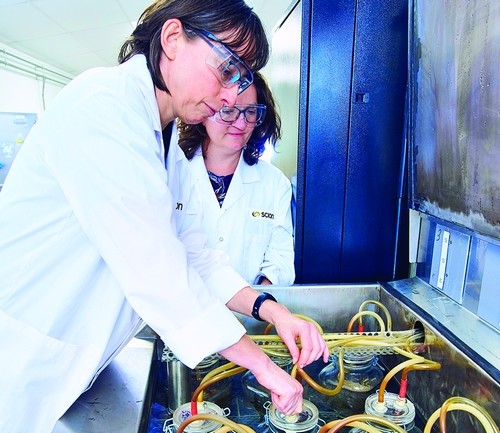Is that biodegradable?
To really consider the true environmental impact of products and materials we need to know how they are made, and what they are made of. Equally important is how products and materials are disposed of and if they end up in the environment, how they break down. To help evaluate product performance at the end-of-life, Scion has designed and built a unique-to-New Zealand biodegradation facility for measuring the aerobic biodegradation of materials such as plastics, paper and wood under a range of standardised environments.
Given the international emphasis on sustainability and the rise of biodegradation claims, these tests will become increasingly important to assure environmentally conscious companies and consumers that products are indeed able to biodegrade as claimed. Scion’s biodegradation facility has recently been upgraded to provide more accurate data, verified according to international compostability standards.
Lou Sherman, Technical and Service Leader, says, “When it comes to compostability claims it is important that materials have been validated to biodegrade in a composting environment. International standards have been developed for both home and industrial composting conditions. Our facility is able to follow these standards by measuring the carbon dioxide respired by microbes as they consume the test material.”
“I’m really excited to be able to work with Scion on their testing regime to fit in with international standards so that I can get my compliance completely independently verified.” - Owen Embling, Managing Director, Convex Innovative Packaging
A number of different standards are tested. Scion’s facility can ensure there are no excessive heavy metals (lead, mercury and arsenic) left in the environment. It checks the disintegration by looking at the size of the decomposed particles, ensuring they properly breakdown, rather than just break into smaller pieces. It also can measure for ecotoxic residues from the broken down materials that could affect the health of the microbes in the environment.
In addition to composting, the facility can test how a range of materials might degrade in different environments such as soil or sea water.
Lou says, “Having this facility in New Zealand will give kiwi companies access to knowledge and equipment around composability and biodegradability enabling them to compete in and ensure access to an international market which is demanding reliable data to back up sustainability claims”.
That is an experience that Owen Embling from Convex Innovative Packaging can relate to. He says, “Something that is really important to us and our customers, is that we can’t be seen to be making greenwash claims. If we state that we have a compostable pack, we need to be sure that it is actually compostable.
“I’m really excited to be able to work with Scion on their testing regime to fit in with international standards so that I can get my compliance completely independently verified.”
The biodegradation testing facility was tailor-made to test the biodegradability of a range of materials in different environments. It has capacity to test up to 17 different samples (in triplicate) under controlled temperature, moisture and air-flow conditions.
Investment: Strategic Science Investment Funding

